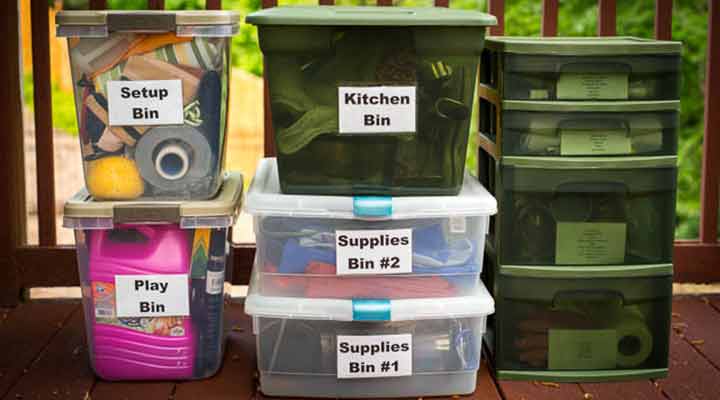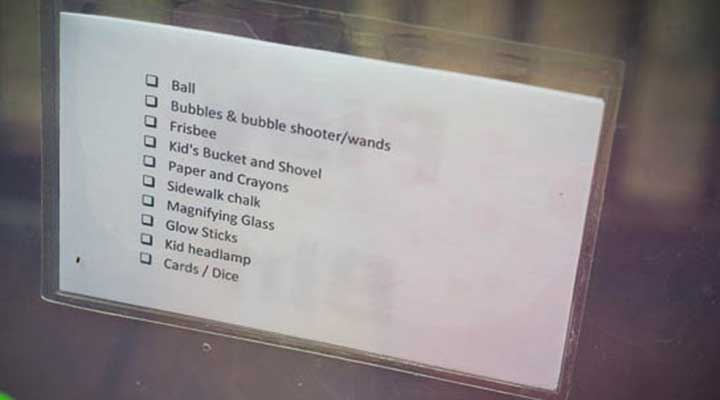
Genius Camping Storage Solutions that Make Packing Easy
Jun 11, 2024 / Alyssa Duranty
Our avid family vacationers use camping storage solutions so effective, these guys can pack fast even with family in tow.
Being organized also clears more storage space for other hobbies and gear used during the camping off–season. It gets rid of the clutter.
Learn what to put on your camping checklist and how to keep everything organized in camping storage bins.
Camping Storage Ideas: Get Packing
Organize by category. According to Dallas Shewmaker, owner of LowerGear outdoor supply, the main categories for camping are shelter, sleep supplies, lighting, food, and storage. Keep in mind the specifics of the weather and the terrain to guide your choices.
Store camping items together in plastic bins. This makes getting ready for a trip as easy as carrying pre-packed boxes to your car, suggests Kelley Krohnert, mom and Taking on Today blogger. Her Atlanta-based family tries to go camping several times a year, so Krohnert put together several large, plastic bins that she labels and stores in the same space, a system she’s successfully used for years.
Make labels and a camping checklist to tape Inside each bin. “Keep a good list on what goes in a bin, so you can check. Make sure everything is inside before you go,” says Krohnert. Misty Marsh, a mom of four who writes about her family adventures on YourOwnHome Store, laminates her lists and secures them to the top of each bin.
Organize seasonally. Krohnert likes to be prepared for the different seasons, so she makes two lists—one for summer, the other for winter. That way she remembers to bring climate-friendly items, like beach towels and sunscreen instead of thick blankets and coats, at the right time of year.
Separate permanent and single-use items. Marsh also uses lists, but she splits hers into two sections this way: one for supplies that need to be washed or refilled after every trip, the other for items that stay in the tubs permanently.
Get the family involved. Marsh recommends involving kids in the packing project by letting them fill a tub with “inexpensive, but fun things—coloring books, balls, card games, books—and only comes out when we go camping, so it is special. My kids always look forward to it.”
Invest in duplicates
Krohnert has an extra set of all kitchen supplies she uses while camping, which she keeps in a four–drawer unit.
Instead of making a mess while trying to find skewers in the kitchen for campfire s’mores, Krohnert suggests buying an extra set of any items for home and camping. Then you can stay organized on both the home and vacation fronts.
Krohnert has an extra set of all kitchen supplies she uses while camping, which she keeps in a four–drawer unit.
“The drawers turned out to be an amazing idea,” Krohnert said. “It’s our travel kitchen and holds plates, silverware, cups, paper towels, Ziploc bags.”
Shewmaker agrees, noting that, “You are much better off with dedicated camping things in the dedicated camping storage bin. It’s easy to grab the salt and pepper shakers off the kitchen table before you walk out the door, but it’s too easy to misplace or forget things that way.”
Plus your camping items can be lightweight and much smaller than their at-home counterparts.
Count calories. If you’re not sure how much food to bring, crunch the numbers.
Shewmaker recommends deciding on how many calories you’ll need to consume each day, and planning your food based on that. When it comes to water, he recommends a gallon per person per day as a rule of thumb.
Don’t overpack. Stick to the essentials, especially if you’re going to be backpacking or hiking to your destination. According to Shewmaker, some of the main things to leave at home are:
- Unnecessary electronics
- Glassware
- Too much clothing
- Perfumes and other scented items (besides insect repellent)
- Items that can be replaced with a multi-use version, such as an all-in-one pan.
Summer camp on the horizon? We have more packing tips for sending off the kids this way.
Camping Storage Ideas: On-Site Organization
You’ve got your essentials, but now you need to keep them in check once the tent is up. Use these tips to stay organized from sunrise to s’mores time.
Portable drawers work on the road. Krohnert keeps kitchen gear in a four–drawer unit.
“The drawers turned out to be an amazing idea,” Krohnert says. “It’s our travel kitchen and holds plates, silverware, cups, paper towels, Ziploc bags.” This portable kitchen fits easily in her car and keeps food items clean and safe at the campsite.
Be mindful of waste. Respect your surroundings as well as your safety by making sure waste products are properly bagged and disposed of.
Color code. If you have items going into bags, consider color-coding them for an easy way to grab the items you need. This can also work to separate food items into breakfast, lunch, dinner, and snacks.
Think outside of the (shoe) box. Hanging shoe containers are a useful way to keep clothing, cooking supplies, blankets, and extra batteries organized. Fasten them to a clothesline or tree for some DIY outdoor storage.
We’ve got more DIY camping storage tips for you here on our blog.
Off-Season Storage Ideas
Of course, all things must come to an end, including the camping season. When the sun has set on your vacation, you’ll want to keep your gear organized until it’s time to break it out again next season.
Make sure your items are clean and dry before storing. Before your bins get stowed away in the garage or shed, make sure everything is dry and items like dishware have been washed.
Refill as soon as you get home. Take an inventory of what you used while you were gone, and refill items like dish soap immediately. You’ll be able to get on the road quickly next time you have some unexpected time off or early warm weather.
Keep your items in good condition. Make your items last longer (and avoid unexpected surprises) by checking for any damage to your equipment that might need immediate attention. Take the time to fold your tent correctly to avoid rips or tears. Finally, make sure your storage bins are water- and weather-proof with snug-fitting lids so bad weather doesn’t spoil your next weekend trip.
Get high. If your garage is feeling cramped, vertical storage can help you maximize your space. Stack smaller items in cubbies, keep boots and tools on shelves, and consider using a wall mount for mountain bikes and folding chairs.
With these expert packing tips, you and your family will be able to enjoy more fulfilling camping experiences this summer, and for years to come. Happy campers all.
Prefer the beach to the woods? Check out our beach day packing tips.
Laura Bolt contributed to this report.








